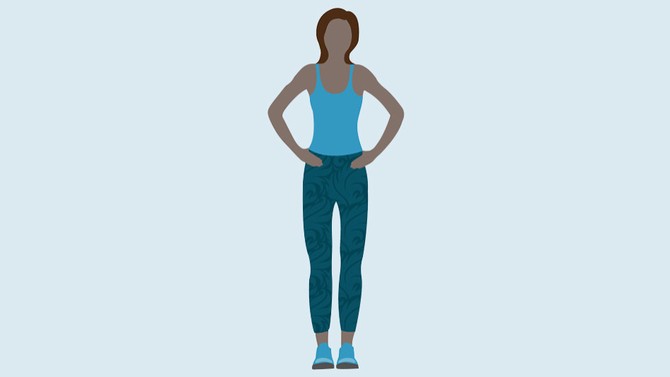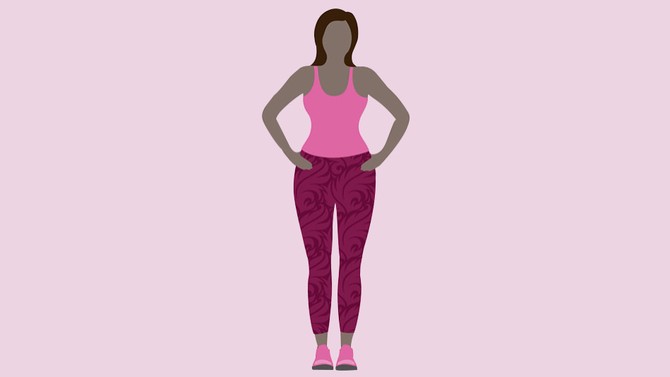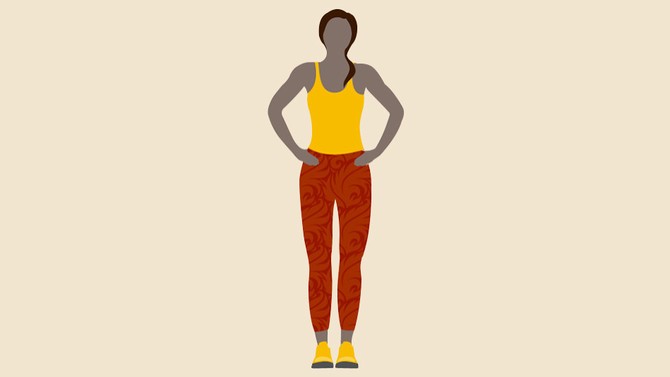The Best Morning Routine Based on Your Body Type
There are some universal rules that apply, no matter your shape (don't skimp on sleep!). But your body type can also hold surprising clues as to the right exercise and diet habits for you.
By Jessica Migala

Illustration: Oprah.com
Ectomorph
Your body type in a nutshell: You're naturally lean and have trouble putting weight on. You may also be thin but carry a lot of fat (aka "skinny fat").
Your ideal routine: One that embraces the unexpected. You may find you naturally gravitate toward endurance activities (like running), says Brian St. Pierre, MS, RD, CSCS, director of performance nutrition at Precision Nutrition. However, that may mean you're missing out on essential strength-building workouts. For a well-rounded routine, add in plyometrics (jumping lunges, squat jumps, box jumps) or weight-based exercises, recommends Stacy Sims, PhD, exercise physiologist and nutrition scientist, author of ROAR: How to Match Your Food and Fitness to Your Female Physiology for Optimum Performance, Great Health, and a Strong, Lean Body for Life.
Since you have a fast metabolism, your body can handle a greater amount of carbs—lucky you—but you'll want to focus on wholesome, fiber-rich carbs, which give you lasting energy. Try a sweet potato (rich in complex carbohydrates) topped with a bit of almond butter for satiating fat (seriously, try it), a hardboiled egg (for some protein) and fruit (more carbs!).

Illustration: Oprah.com
Endomorph
Your body type in a nutshell: You can put body fat on easily, and it can be tough to lose weight. Your upper and lower body can fall into different body types, so you may notice you store fat up top or in your rear or thighs, says Sims.
Your ideal routine: Calm and restorative. Lowering your levels of cortisol, the stress hormone that prompts your body to store fat, is key. First up: Practice mindfulness meditation. The technique, where you sit quietly and focus on your breath, has been shown to help reduce morning cortisol levels, therefore reducing stress.
Finding an exercise you love and sticking with it is another powerful buffer against stress. Though you will want to be mindful of how you fuel up before extreme exercises. "Hard workouts will cause your body to release a lot of cortisol during recovery, stimulating your body to put on fat." says Sims. To buffer that effect, you should eat a pre-exercise snack instead of going to the gym without anything in your stomach. A light bite that includes both carbs and protein, like a little vanilla protein powder stirred into coffee with a small banana will power you through without overloading on calories, says Sims.
Come breakfast time, choose metabolism-boosting eats. That means higher fat (avocado, nuts) and protein (eggs, Greek yogurt, cottage cheese) plus fewer carbs (oats, whole grains), which will work well for fat-burning and keep you satiated until lunch.

Illustration: Oprah.com
Mesomorph
Your body type in a nutshell: You can easily pack on muscle (you might describe your body type "athletic"). You can also be a combination of an endomorph and mesomorph. For instance, you put on muscle quickly but have a hard time trimming the fat on top.
Your ideal routine: Balanced and connected. Before you exercise in the morning, eat a snack with protein and carbs, says St. Pierre, which will optimize muscle building and give you fuel to tackle your workout. (A container of Greek yogurt is a good option.) Since you're naturally athletic, you may already be doing strength workouts. Keep it up—with a couple of suggestions. To create long, lean muscles, Sims recommends reaching for lower weights with higher reps or doing a high-intensity interval workout (HIIT) to tone.
If you're not feeling hungry afterward, grab a protein recovery drink to deliver the hydration and nutrition your muscles need, says Sims. Or if your stomach's grumbling, a well-balanced breakfast (such as cottage cheese with fruit and nuts) will offer a nice mix of protein and carbs to rebuild muscles and replenish glycogen stores, plus a little satisfying fat to keep you full.
And remember to make time to invest in your mental well-being as well. Emotional stress can impede short-term muscle recovery after exercise, research shows. This means you'll want to do things that maximize your mental health too. One option: Try to spend some time in the a.m. connecting with loved ones (call a friend, sit down with your kids to eat, hug your partner), as close relationships with loved ones help you stay calm and happy, according to the American Psychological Association.
Published 01/31/2018

